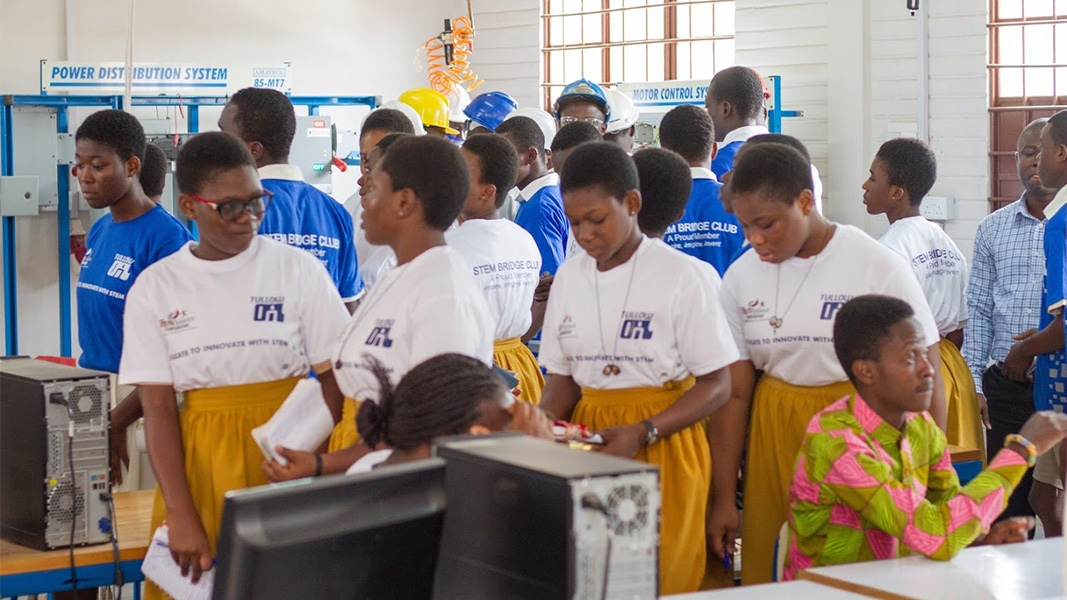Related documents
Related links

Tullow partners with Right to Dream Academy to establish STEM academy in Ghana.
Tullow has been supporting Right to Dream, a football academy and school in Ghana, since 2014. In 2017, Tullow started a new partnership to provide specific support for a science, technology, engineering and mathematics (STEM) programme with the aim of establishing Right to Dream as a top STEM academy in West Africa for children aged between 10 and 18.
Right to Dream identifies talented children and provides them with the education that will transform their lives and open up opportunities for them to enter high skill professions, to become leaders and give back to their communities. The STEM programme aligns with Tullow’s focus on education and capacity building and with the Government of Ghana’s ambition to improve STEM education.
Through the Tullow supported programme Right to Dream now provides a Cambridge accredited curriculum in core STEM and humanities subjects and is beginning to see success. A robotics team from the Right to Dream academy took part in and won the Southern Ghana Robotics competition and went on to take part in the World Championships in the USA in May 2018 where they placed eighth in the competition. The team’s success raised the profile of Right to Dream beyond their well recognised achievements in football.
As well as focusing on academic success, Right to Dream also prioritises character development and a formal programme is integrated into their curriculum to support students to become resilient future leaders with the skills and capabilities to succeed.
The Character Development programme changed my life. I learnt how to behave in a different way and to approach challenges and new things with a growth mindset.
Ousseni Bouda, Right to Dream academy student now attending Millbrook School in Connecticut, USA.
We are now over half way through the three-year partnership and Right to Dream are continuing to improve their STEM programme by embedding innovative programmes across the curriculum. In addition, they have established a partnership with Bucknell University Engineering school in Pennsylvania to train their teachers and robotics teams in computer programming techniques. The key challenge is to gain funding from other sources so the long term sustainability of the STEM programme can be secured.
Tullow’s partnership is not just about financial support but also providing opportunities for Tullow staff to engage with the project and mentor students. Three students recently completed internships in Tullow Ghana where they gained work experience in a number of areas across the business (supply chain, EHS, and operations/engineering) and which we hope will inspire them to consider careers in these disciplines. Another element in our support is to enable Right to Dream to deliver a community outreach programme, and students and staff have designed a tailored Lego based curriculum to teach in local village schools to provide children with basic computer programming and robotics skills using Lego.
We measure the performance of the partnership by the number of students awarded Right to Dream scholarships per year and the number who go on to achieve full scholarships in US and UK colleges and universities each year. We have seen a number of final year students securing scholarships at leading universities including the University of Pennsylvania and Stanford. A recent analysis conducted of the 18 current Right to Dream students at U.S boarding schools revealed very positive trajectories of students progressing towards STEM-related University courses. Data shows that 50% of Right to Dream graduates have taken or are on track to take Calculus in their senior year; this compares to the U.S national average of 23% at private schools and 16% for all U.S. high schools.
This suggests Right to Dream is already providing a strong foundation in STEM. Another measure of success will be whether the students enter technical industries and truly add to the skills and capacity of Ghana’s economy. Tullow will be monitoring this over the next 10 years.